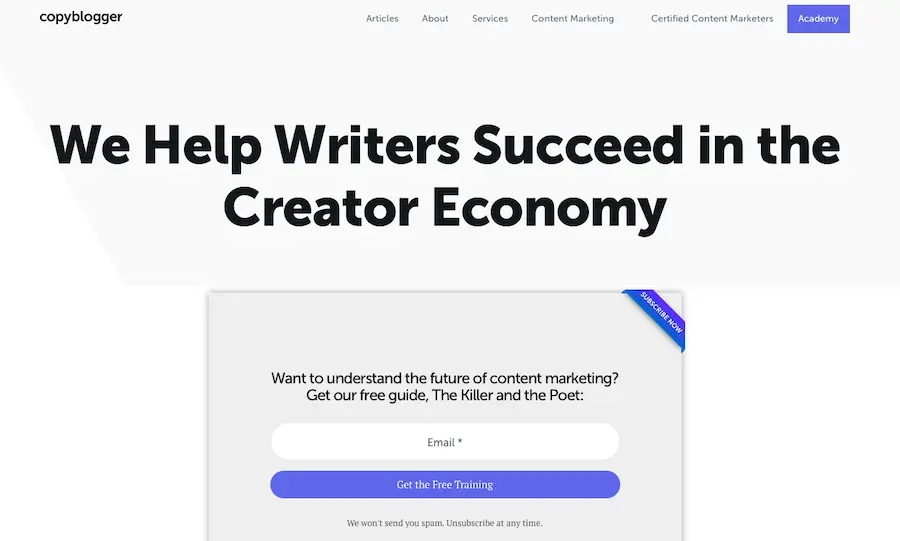Have you ever dreamed of making a living by writing, right from the comfort of your own home? Freelance copywriting could be your ticket to this lifestyle. It's not just about having a way with words though. It's about using them to create something powerful and persuasive.
This guide is especially crafted for those just stepping into the online money-making scene. We're going to walk through the essentials of kick-starting a career in freelance copywriting. And when it comes to standing out online, we can't overlook the importance of a slick, professional website.
We’ll cover all that and more here today.
What is Freelance Copywriting?

So, what does freelance copywriting involve, exactly?
Think of it as writing with purpose and personality. Whether it's website content, catchy ad slogans, or engaging blog posts, your job as a freelance copywriter is to get people excited and interested in a client’s products or services.
The cool part? As a freelancer, you get to pick who you work for and what projects you take on. Unlike a traditional employee, the type of writing work you take on will likely be much more varied.
Here are some reasons why freelance copywriting is such an attractive field to pursue:
Endless Opportunities: No matter the economy, companies always need great writers. Businesses need people like you to write compelling copy to help them stand out in a crowded field.
More Freedom: Most freelance writing gigs allow you to work from anywhere, whether it be a beach, a cafe, or your living room. All you need is your trusty laptop and a good internet connection.
It's More Than Writing: To truly shine, you'll need a mix of creativity, a knack for marketing, and a solid understanding of what makes people tick. Plus, through researching assignments, you get to learn all about different topics.
It's not just about being a good writer, however. You've got to be a bit of a detective (think research skills), a stickler for details, and a master of deadlines. And since you're flying solo, being self-motivated and organized is key.
Getting Started as a Freelance Copywriter
Jumping into freelance copywriting does require a bit of strategy. Here’s a more detailed roadmap to get you started:
Step 1: Educate Yourself
Immerse yourself in the world of copywriting. There are countless resources – from online courses and webinars to books written by industry experts. These resources cover everything from the basics of persuasive writing to advanced marketing techniques.

A few good places to check out include:
Step 2: Practice, Practice, Practice
Like any other skill, writing improves with practice. Start a blog on a topic you're passionate about, contribute guest posts to established blogs, or volunteer to write for local businesses or nonprofits. Each piece you write hones your skills and adds to your portfolio.
Step 3: Build a Diverse Portfolio
Speaking of, your portfolio should showcase a variety of writing styles and formats. Include pieces like blog posts, ad copy, email campaigns, and website content. A diverse portfolio demonstrates your versatility to potential clients.
Step 4: Create an Online Presence
Your social media profiles can be powerful tools for networking and showcasing your work. Platforms like LinkedIn, Twitter, and Instagram can help you connect with other writers, potential clients, and industry leaders. It can also drive traffic back to your portfolio or website.
Step 5: Explore Freelance Platforms

While they shouldn’t be your only source of work, platforms like Upwork, Fiverr, and Freelancer can be good starting points to gain experience and build client relationships. The key is to gradually transition from these platforms to direct client relationships for more control and higher earning potential.
Step 6: Network Effectively
Attend industry events, join online forums, and participate in writing communities. Networking isn’t just about getting jobs though. It’s also about building relationships that can provide support, advice, and opportunities later down the line.
Step 7: Learn Basic SEO
As a copywriter online, understanding the basics of Search Engine Optimization (SEO) can be a huge advantage. It will not only improve your writing but also make it more valuable to clients. Though there are distinctions between content writing and copywriting, some copywriters are expected to deliver SEO-optimized content as well, so keep that in mind.
Create a Personal Brand
Your personal brand is your most powerful marketing tool. Here’s how to build a brand that resonates and attracts clients:
Identify Your Unique Selling Proposition (USP): What sets you apart from other copywriters? Maybe it's your industry expertise, your witty writing style, or your exceptional research skills. Pinpoint what makes you unique and use it to differentiate yourself.
Develop a Professional Image: Everything from your social media profiles to your business cards should reflect your professional image. Use a consistent color scheme, logo, and professional headshot across all platforms. This consistency helps clients remember you and adds to your credibility.
Content is a Priority: Use your website and social media to publish original content. Share your insights about copywriting, tips for potential clients, and industry trends. This not only demonstrates your expertise but also helps with search engine visibility.
Engage with Your Audience: Respond to comments, participate in relevant online discussions, and be active in communities. Engagement helps build relationships and increases your brand awareness.
Ask for Testimonials: Positive reviews from past clients can significantly boost your credibility. Don’t hesitate to ask satisfied clients to leave a testimonial for your website or LinkedIn profile.
Stay True to Your Voice: Consistency in your writing style and the type of content you produce will help you attract the right kind of clients. Whether you're humorous, informative, or formal, stay true to your voice.
Your personal brand is a reflection of who you are as a professional. It takes time to build, but with dedication and consistency, it becomes a powerful asset in growing your freelance copywriting career.
Building Your Freelance Copywriting Website – A Key to Success
Your website is not just a platform; it's a reflection of your brand and a magnet for potential clients. Here's how to build a site that stands out:
Choose the Right Domain Name
Start with a domain name that's easy to remember and reflects your brand. It's your first impression online, so make it count. Use your name or a unique blend that captures the essence of what you’re going for.
Select Quality Hosting
A reliable hosting service like Verpex ensures your website is always up and running smoothly. With their user-friendly interface, excellent customer support, and robust performance, Verpex is an ideal choice for freelancers looking to make a strong online impression.

The hosting plans for WordPress, in particular, are a good deal.
Create a Design That Speaks Volumes
You don’t need to be super tech-savvy to create an appealing website. Choose a clean, professional template that aligns with your brand's aesthetic. If you opt for a WordPress site, there are literally thousands of themes available to customize your site’s look. Remember, your website should be easy to navigate, visually appealing, and reflective of your professional image.
Quality Content is a Must
The content on your website is the first impression potential clients will likely have of you and your work, so be sure to populate it with engaging, well-written content. Include an About Me page that tells your story, a Services page outlining what you offer, and a Portfolio page showcasing your best work. Regularly updating a blog on your website not only keeps it fresh but also helps with SEO.
Call-to-Action
Guide visitors to take action. Whether it’s contacting you, downloading a resource, or subscribing to your newsletter, clear CTAs are essential in converting visitors into clients.
Now that you're set up, it's time to think big. Growing your freelance copywriting business is about smart strategies and consistent effort.
Here’s how to keep the momentum going:
Expand Your Services: Don't limit yourself to one type of writing. Explore different areas like SEO writing, technical writing, or social media content. Diversifying your services can attract a wider range of clients.
Target Your Niche: While versatility is good, specializing in a specific niche can make you the go-to expert. Whether it's health, technology, or fashion, find your passion and build your expertise around it.
Build Strong Client Relationships: Happy clients are repeat clients. Go above and beyond in delivering quality work, meeting deadlines, and maintaining clear communication. Your professionalism can turn a one-time gig into a long-term partnership.
Keep Learning: Stay updated with the latest industry trends, tools, and best practices. Continuous learning keeps your skills sharp and your services in demand.
Start Your Freelance Copywriting Career
Diving head-first into a freelance copywriting career is an exciting journey filled with opportunities. You’ll need to continuously work on your writing skills and build your personal brand and website. It’s a lot to take on, but every step you take brings you closer to success.
Remember, the key to thriving in this field lies in learning, adapting, and connecting with your audience. And when it comes to establishing your online presence, a reliable hosting service like Verpex can be your best ally.
So, are you ready to write your own success story?
Frequently Asked Questions
Do DIY blogs make money?
Yes, DIY blogging can bring you are steady income. There are several effective and proven methods to monetize your DIY blog and earn some real money.
How do beginner blogs make money?
One of the most common ways that beginner blogs make money is through display advertisements and affiliate marketing.
How do DIY blogs make money?
Some ways you can make money from your DIY blog include sponsored content, direct sales, advertising space, ad networks, affiliate programs, and so on.
How can I start a forum and make money?
Some of the ways to monetize a forum include premium memberships, holding offline events or conferences, doing direct sponsorships, monetizing links, selling merchandise, applying to ad networks, and so on.

Brenda Barron is a freelance writer and editor living in southern California. With over a decade of experience crafting prose for businesses of all sizes, she has a solid understanding of what it takes to capture a reader's attention.
View all posts by Brenda Barron




















